Leylah Annie Fernandez and Denis Shapovalov were involved in three-set matches in the third round of the BNP Paribas Open on Monday, and both of them came down to third sets that were mainly one-way traffic affairs.
Fernandez had things going her way in the final set of her match with Shelby Rogers, winning it 6-1, 3-6, 6-3 while Shapovalov lost early momentum and found things headed in the wrong direction after the second set of a 6-7(4), 6-4, 6-4 loss to big-serving Reilly Opelka.
The Fernandez – Rogers match featured 3-0 leads in all three sets, with the early advantage proving decisive in each one. In Shapovalov – Opelka the competitive balance was even after two sets but everything changed when Shapovalov lost serve in the opening game of the third set. He was then only able to win a total of five points in the seven-foot American’s five service games that followed.
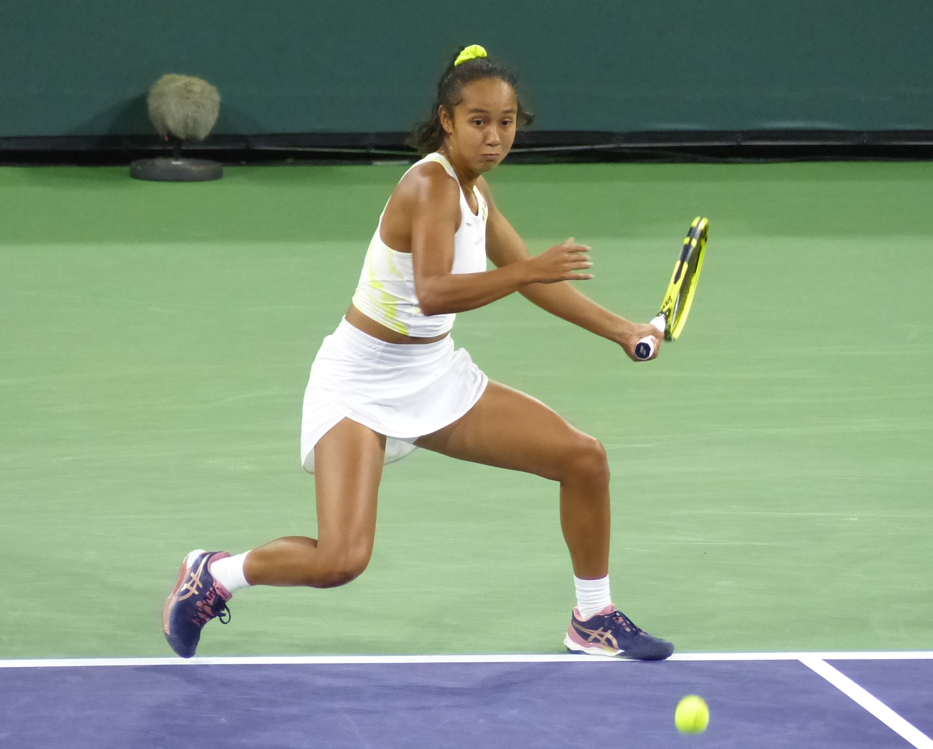
Fernandez was fast out of the blocks against Rogers, dominating rallies with crisp shot-making while the 29-year-old American had trouble getting up to speed. That all changed in the second set as her heavy groundstrokes and powerful serving found the mark, putting a more error-prone Fernandez on the back foot.
That might have continued in the third if Rogers had converted a break point in the opening game. But she missed with a service return, Fernandez held serve and was basically home free as she loosened up and took over the match.
She was clearly the crowd favourite in main Stadium 1 with its capacity of 16,100 less than a quarter full because it was the last match of the evening as well as the annual inevitable attendance lull that follows a weekend of super-crowded days and nights.
“That definitely helped me refocus for the third set,” Fernandez said about the support. “A few times I would look up and see Canadian flags. I was thinking, ‘yes this is good – let’s keep working. Let’s get to the next point, keep fighting.’ I was glad to hear them cheering me on.”
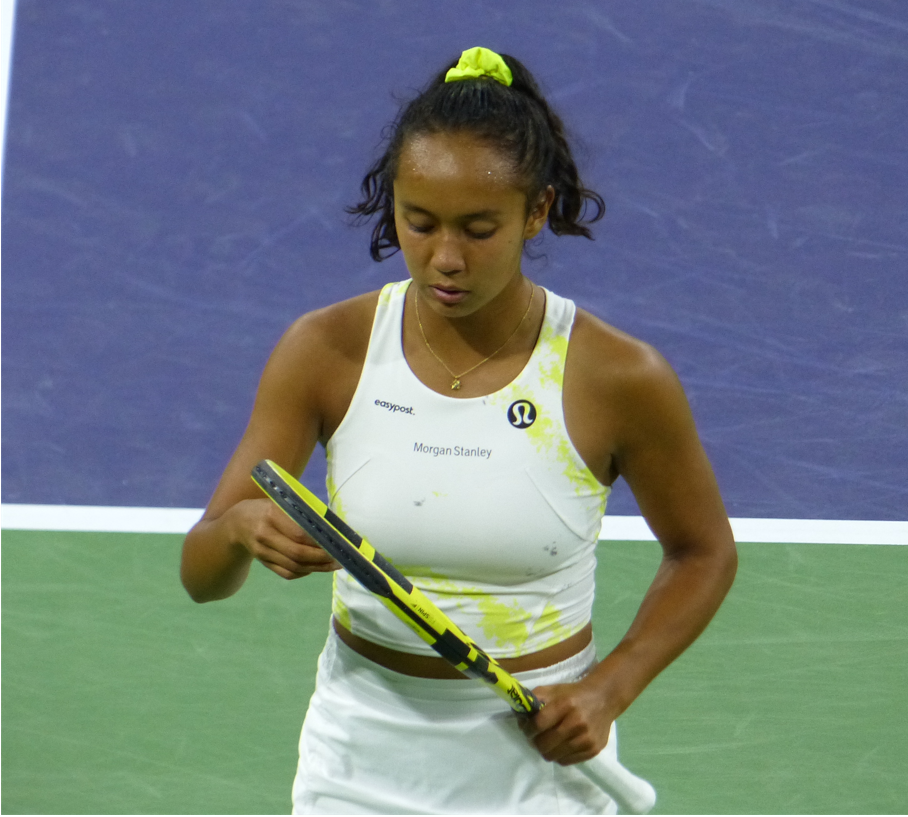
After a quick 25-minute first set, the eventual match time was an hour and 39 minutes with Fernandez carrying the majority of the play – her break point conversion rate was 3/11 while Rogers’ was only 1/4.
The Fernandez win sets up a meeting with defending champion and No. 5 seed Paula Badosa who defeated her Spanish compatriot Sara Sorribes Tormo 7-6(4), 6-1 on Monday.
They have played once before – pre-pandemic – in Auckland in 2020 and Badosa won 7-5, 7-6(3).
“Leylah, she’s coming from winning a tournament,” said Badosa. “She’s with lots of confidence. She’s an amazing player. I was going to say in the future because she is very young, but I think she is in the present already.”
From the 19-year-old Fernandez’s perspective, she said about the upcoming match with Badosa, “it will be a very tough one. She’s the defending champion. She has a lot of good matches under her belt. I’m very excited to play against her.”
The match will be not before 6 p.m. (9 p.m. ET Canada) in Stadium 1, and the evening or night conditions appeal to both players. Fernandez said she prefers nighttime because the crowd seems to get more involved and she doesn’t see much difference from the way the court plays in the daytime.
As for Badosa, she said, “I like to play at night. I like the conditions. I like it when the conditions are a little bit slower and I can hit the ball hard and I know it’s not going to go out.”
After starting the 2022 season 1-2, Fernandez has found her game and is now on a seven-match winning streak after winning the WTA 250 in Monterrey, Mexico earlier this month. While she may not quite be in 2021 US Open finalist form, she is pretty close.
“I'll just try to focus on my game,” she said about Tuesday’s fourth round, “and see what my dad (coach) has in store for me to execute.”
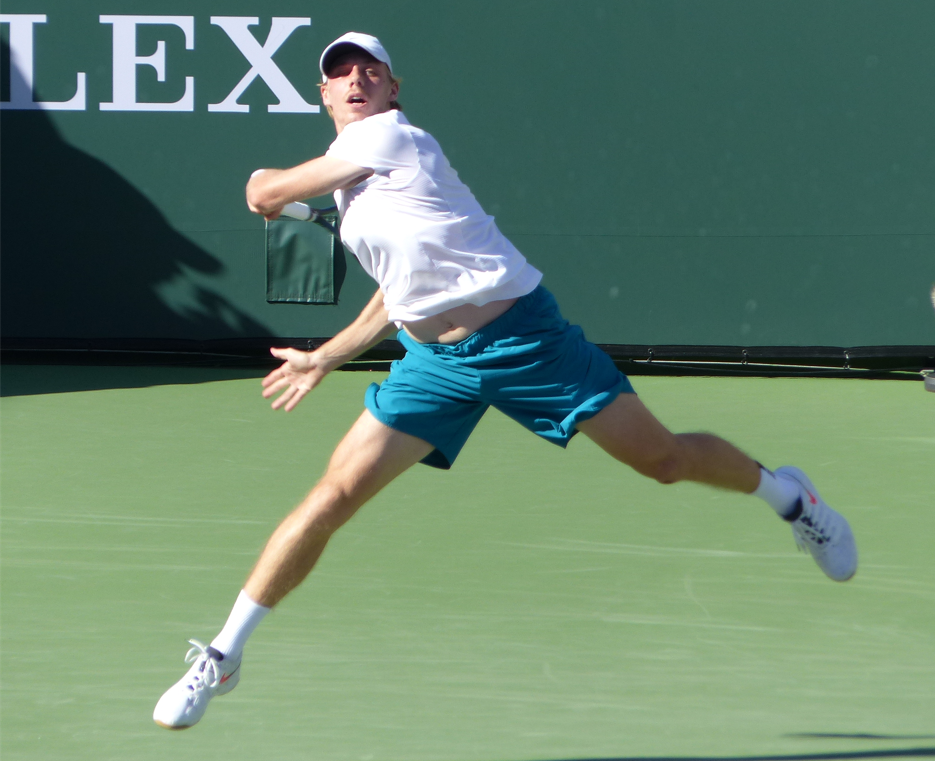
In the Shapovalov match, it seemed as if he was doing a good job handling the mighty serves of Opelka – until he wasn’t.
In the first two sets, he was getting a lot of them back in play, forcing the seven-foot American to engage in rallies.
Shapovalov won the opening set despite some showy stats for Opelka who began the match on the very first point with a 141 mph ace. A couple of games later a fan called out “let’s see 150 Reilly.” For the record he did hit a 145 mph serve but never got close to 150 despite the dry desert air that has always given a boost to big servers. Shapovalov was consistently in the 125 mph first-serve range.
The opening set came down to a tiebreak after Opelka staved off two break points in the fifth game and Shapovalov saved one in the eighth game.
Two poorly-played points by Opelka serving at 1-2 in the tiebreak, giving Shapovalov a 4-1, double mini-break lead, was enough to decide the 54-minute set.
Things looked positive for Shapovalov in the second set until he lost serve in the third game after having a 40-love lead. As he moved into position to receive serve in the following game, he whacked himself in the head with his racquet seemingly aware that his grip on the match was loosening.
“I was having a tough time with myself and kind of letting that game go,” he said. “Then in the third set at the beginning, as well, 30-love, let go of that game as well. Too many mistakes.”
Shapovalov had a break point in the final game to level the second set at 5-5 but Opelka belted a bold unreturnable forehand down the line to save it.
The match made its final turn in the opening game of the third set when Shapovalov serving failed to follow through on a 30-love lead – losing four points in a row for a crucial break.
From there Opelka elevated his serving and Shapovalov never got a sniff at breaking back.
He actually had more aces – 12 to 11 than Opelka (although a stat like service winners might have added more context) – but unfortunately he also led the double faults count – 10-1.
Props to Opelka for an impressive effort, but not only on serve. He played remarkably well from the baseline – dominating rallies often enough against a man who’s used to being the one in control. Unlike extremely tall players such as Ivo Karlovic and John Isner, Opelka has an ease of on-court movement that’s more like shorter men and does a good job hanging in baseline rallies.
“I was in good control, just let it slip a little bit,” Shapovalov about the momentum shift in the match. “Had a 40-love game (third game second set) on my serve. Just let that go, gave him a lot of belief.
“I actually don’t think I served too good, to be honest – I think only 55 per cent first serves (Opelka was 73 per cent). That’s not great. So I struggled with that a little bit – and a lot of double-faults.
“Tough day for me. He didn’t give me many looks at all on his serve. When he’s serving so clean like that, it’s super difficult to get into games. The few chances I did have, he played some great points.”
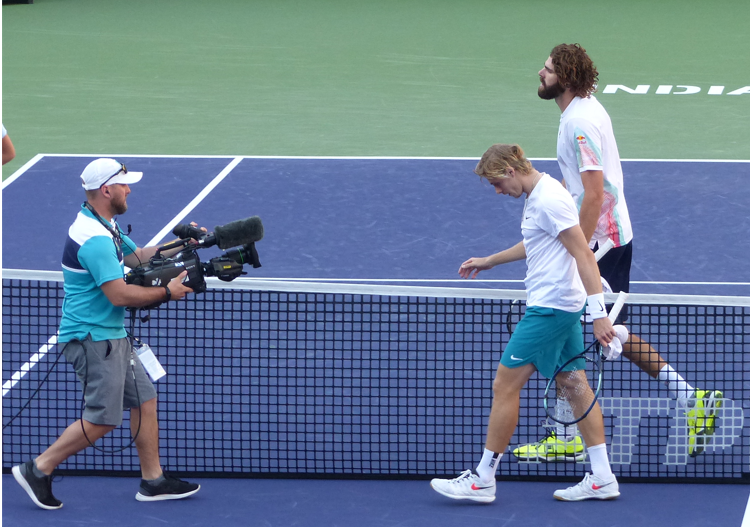
In his media conference, Shapovalov spoke about his ongoing struggle to get on top of the mental side of the sport and competing. “It’s difficult because tennis means so much to me that I try to leave it all on the court,” he said. “Sometimes that’s a little bit too much.
“It’s about finding that balance of wanting it but not excessively killing yourself when you’re losing matches and stuff. That’s been pretty difficult with me. It’s kind of how I grew up. Tennis is really my life. It’s kind of understanding there’s another side of it. There’s more to life.”
As with Félix Auger-Aliassime after his loss to Botic van de Zandschulp on Sunday, Shapovalov, 22 and ranked No. 13, described his quest, saying about himself, “I think I’m on the right road. I’m happy with the way I’ve been able to fight and compete this season – just trying to become better. That’s really what it comes down to.”
AROUND THE GROUNDS
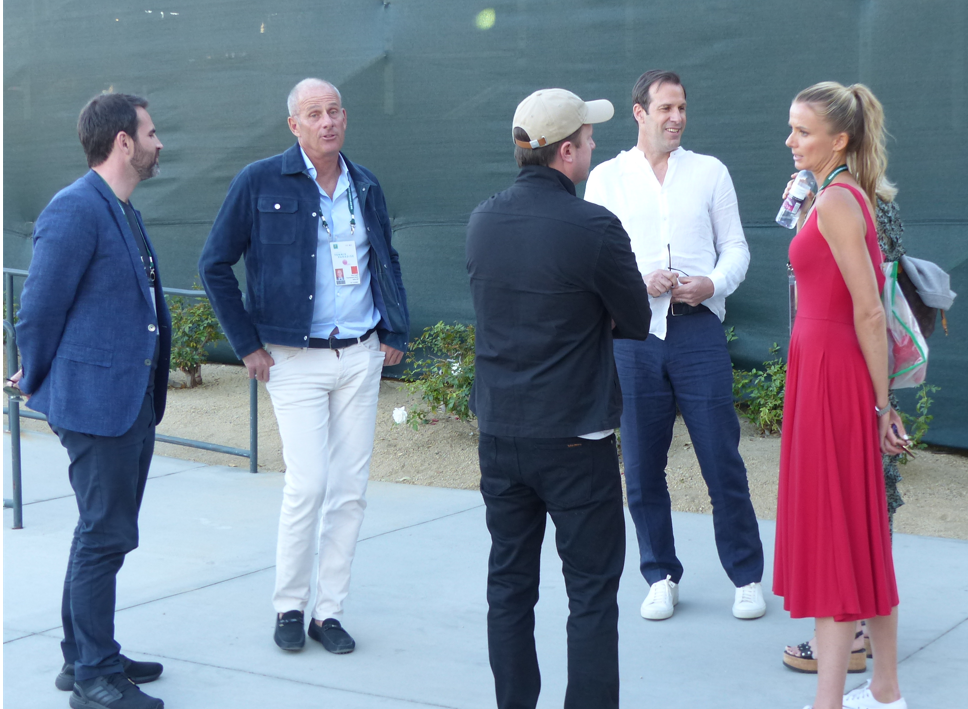
Wandering around the Indian Wells Tennis Garden, enquiring cameras come across random groups of tennis folks engrossed in conversations. The one above included former world No. 4, and until recently the Roland Garros tournament director, Guy Forget, two-time Indian Wells champion Daniela Hantuchova and another former world No. 4 and Montreal native, Greg Rusedski. The latter two are working for Prime Video at the BNP Paribas Open.






